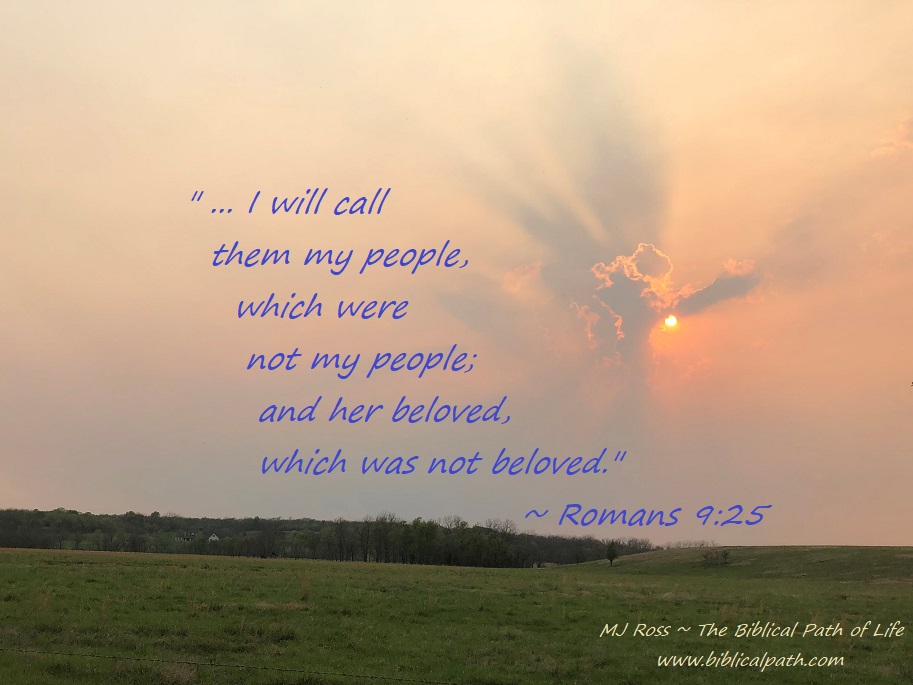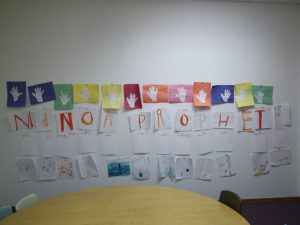
“As he saith also in Osee, I will call them my people, which were not my people; and her beloved, which was not beloved.”
Romans 9:25
Why is it important to read and understand the book of Hosea in the Old Testament? God revealed to Hosea that one day the Gentiles would be included as His people. Understand that Gentiles are any peoples who are not Jews (Israelites). “As he saith also in Osee, I will call them my people, which were not my people; and her beloved, which was not beloved” (Romans 9:25). (Osee is “Hosea”.) This verse is in reference to Hosea 2:23: “And I will sow her unto me in the earth; and I will have mercy upon her that had not obtained mercy; and I will say to them which were not my people, Thou art my people; and they shall say, Thou art my God.” Today, we can become the beloved of God. The word beloved in this verse means “to love or delight in.”
Read the following quick summary of the book of Hosea:
God told Hosea to take Gomer, a “wife of whoredoms”, for his wife in the days of Jeroboam II. Gomer had a son, Jezreel; a daughter, Loruhamah; another son, Loammi; each child represented a relationship between God and His people (see Hosea 1). A warning was given. God revealed His love for His people in the taking away then restoring their necessities. By doing that, He would remove their allegiance to Baal, restoring them as His people (see Hosea 2). Hosea was to love his wife, buying her back, displaying the love God had for His people (see Hosea 3). Hosea told the people that because of their apostasy, God would allow troubles (see Hosea 4). Judgment would fall upon the priests, the house of Israel, and the house of the king. Yet when they sought God, they would not find Him, for He would withdraw from His people. Hosea revealed that God’s wrath would be poured out upon them “till they acknowledge their offence, and seek my face” (see Hosea 5). Encouragement to return to the Lord was given, along with a reminder of the failings of man’s ability to keep their part of the covenant with God (see Hosea 6). ALL of the people had turned from God, and none had returned. For this, God would send destruction (see Hosea 7). Why? “For Israel hath forgotten his Maker”. We then read a listing of the sins, punishments, and the reasons for punishment (see Hosea 8). Recognize the utter rejection of God’s people described during the time of discipline, “My God will cast them away, because they did not hearken unto him” (see Hosea 9). “Ye have plowed wickedness, ye have reaped iniquity.” Yet they are encouraged to “break up your fallow ground: for it is time to seek the LORD” (See Hosea 10). Important reminders: “When Israel was a child, then I loved him” and “my people are bent to backsliding from me” (see Hosea 11). God reminded them from which they came, yet in spite of their faithless behavior, God still called for their return to Him (see Hosea 12). “O Israel, thou hast destroyed thyself; but in me is thine help” (see Hosea 13). The call to repentance: “O Israel, return unto the LORD thy God; for thou hast fallen by thine iniquity.” What God would do if they would only return: “I will heal their backsliding, I will love them freely: for mine anger is turned away from him” (see Hosea 14).
As we glimpsed at Hosea’s personal life knowing the problems that God allowed, recognize that he was still faithful to obey God’s call upon his life. He willingly married an unfaithful wife, just as God willingly chose a people He knew would be unfaithful to Him. Remember the progression in the departure of God’s people from Him. Slow, yet ending in complete separation from Him. Even with the continual cry to seek God, repent, and turn back to avoid discipline, we found God knew that His people would refuse and continue in their path of sin — directly away from God and his mercy.
Just as the Israelites were told of their sin and called to repentance, the same call is now extended to us today. “For all have sinned, and come short of the glory of God” (Romans 3:23). All are guilty of sin, and there is a penalty to pay. “For the wages of sin is death; but the gift of God is eternal life through Jesus Christ our Lord” (Romans 6:23). In addition, God provided One (Jesus) who paid the penalty for us — if only we would receive. “But God commendeth his love toward us, in that, while we were yet sinners, Christ died for us” (Romans 5:8). Just as God extended a call to the Israelites, warning them before judgment would fall, God warns us today. “And as it is appointed unto men once to die, but after this the judgment” (Hebrews 9:27). What response does God require? “8. But what saith it? The word is nigh thee, even in thy mouth, and in thy heart: that is, the word of faith, which we preach; 9. That if thou shalt confess with thy mouth the Lord Jesus, and shalt believe in thine heart that God hath raised him from the dead, thou shalt be saved. 10. For with the heart man believeth unto righteousness; and with the mouth confession is made unto salvation” (Romans 10:8–10). What are we to do with that information? “Seek ye the LORD while he may be found, call ye upon him while he is near” (Isaiah 55:6). As we recognize that because of the rejection of God by Israel, God then allowed the Gentile people to have an opportunity to belong to Him. If we will only seek Him, repent, and turn our lives completely over to Him. The process is the same, and the eternal salvation is yet to be seen. Nevertheless, we know that God told us to seek Him, while He may be found.
Have you recognized God’s call upon your life, then responding not only to the call for salvation, but in service to Him?


